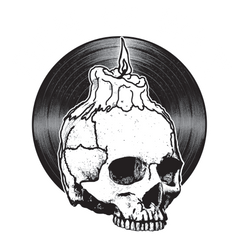Frankie & The Deadbeats
The Shining
Available on transparent blue wax, limited to 75
Country music is often assumed to pander exclusively to America’s poor and rural white folks and Southerners, a stereotype that belies the much broader appeal of its storytelling, melodic immediacy, and tradition steeped timbre. It’s true—the output of Nashville’s hit factory may cater to a narrower demographic, but artists like Johnny Cash, Willie Nelson, Waylon Jennings, and George Jones managed to craft timeless songs that touched upon universal hardships and resonated with a broad swath of music fans. So while a pedal steel and a twangy guitar might conjure images of the American west, there is also something in that combination of sounds that can stir the hearts of people across the world. And for five wild punks of Prague’s Frankie & the Deadbeats, that dusty bucolic sound was the perfect vehicle for their outlaw escapades. On their debut album The Shining, Frankie & the Deadbeats pay homage to American country music while filtering it through the distinctive lens of Slavic fatalism and Bohemian artistry. The album opens with “Deadbeat Waltz,” a Morricone-tinged instrumental of sorrowful slide guitar and minor key chord progressions. This ain’t no honky-tonk; this is Cormac McCarthy’s sepia-toned sunsets set to music. When the album moves on to “Once Upon a Time,” vocalist Frankie Knuth steps into the limelight, singing “once upon a time, you were crucified,” in an accent-inflected baritone. The effect is reminiscent of the musical choices of David Lynch’s Twin Peaks—an ominous juxtaposition of camp theatrics and a dark spin on pop-culture nostalgia.
That tightrope walk between reverence and kitsch continues across the span of The Shining. Songs like “Let it Rain” and “In the Middle” almost conjure the fire-and-brimstone liturgies of Nick Cave or Sixteen Horsepower, but there’s also something in their sound that implies a wink and a smirk, something that seems to say “yeah, we’re all wearing costumes… even our heroes… and we’re not afraid to call it out.” That sardonic edge adds an extra dimension to their music, one that downplays the gravity of their mournful melodies while highlighting the charisma of these misfits and miscreants. Whether you’re a sucker for the charms of the upbeat two-step or the forlorn down-and-out ballad, there’s undoubtedly something on The Shining that touches upon your preferences for old-timey Americana. But in the hands of these mischievous Frankie & the Deadbeats, the yesteryear sound is less of a trip down memory lane and more of a sly subversion of that sound’s supposed innocence.






